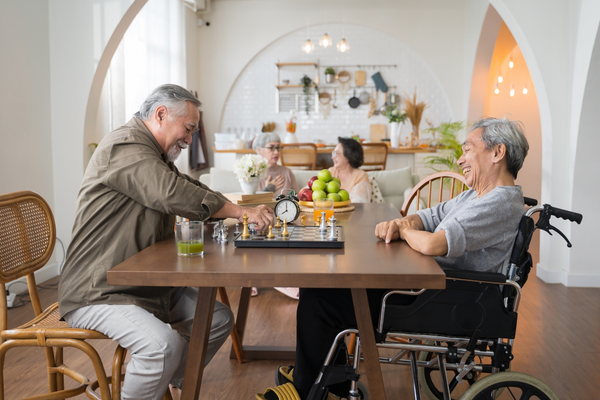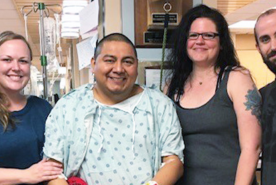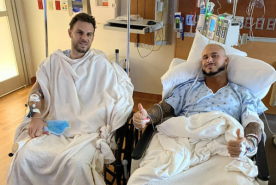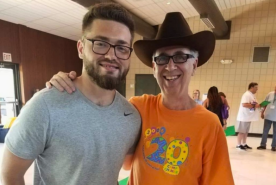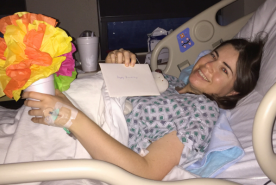September 13, 2022
Are you wondering how to help your loved one with their post-kidney transplant journey? Here are 5 ways you can make a difference in their lives.
1. Learn about kidney transplant aftercare
Normally, the body's immune system fights off anything that isn't part of itself, like germs and viruses. A kidney rejection is a normal response after any transplant surgery, which is why antirejection medicine is so important.
- Acute rejection: Usually occurs during the first year after transplant and can usually be treated.
- Chronic rejection: Occurs over a longer time, and treatment is often unsuccessful.
Should your loved one experience rejection, they may need additional support. Remind them that rejection isn't their fault and encourage them to speak with a mental health professional, kidney transplant team, or primary care doctor if they experience depression.
2. Be specific
Don’t leave them guessing about your abilities or availability. Here are a few specific ways you can offer help.
- Transplant recipients have a lot of checkups within the first year to ensure the kidney is working well. Offering to drive them to these appointments, especially during the first few weeks, can be extremely helpful.
- Staying at a healthy weight is very important for people with transplants, so offer to become a walking or workout buddy.
- Help around the house, do garden work, or bring over transplant-friendly foods during the first few months after the transplant, if they are experiencing adverse side effects from medications, or are under the weather.
- If they are having a hard time sticking to a medication schedule, ask if you can help set up a system that works– maybe you text them, help create a calendar, or set up cell phone alerts.
- Watch your health. Kidney transplant recipients generally have poor immune systems due to their antirejection medication. If you aren't feeling well or have had contact with someone sick, wait until you're not contagious to visit.
3. Remember that mental health matters
[VIDEO::http://www.youtube.com/watch?v=zPrCBC61KWE::aVideoStyle]
Receiving a kidney is wonderful and life-changing, but it can also be stressful. For example, someone could be thankful for their donor and excited for their new life but worry about losing the donated kidney to rejection. Programs like NKF Peers and NKF Kidney Communities offer a safe space for kidney transplant recipients to talk about their feelings and receive guidance from people who have been in their shoes.
- NKF Peers: This program offers people with kidney transplants a safe space to connect with trained mentors via telephone or in-app chat. Sometimes speaking with people in a similar situation provides valuable insight and allows people to feel part of a community.
- Kidney Communities: Our online communities offer a safe, anonymous, and supportive place for patients and caregivers to share experiences, ask questions, and get answers related to kidney donation and transplantation.
4. Share resources
Unless you've undergone a kidney transplant, you likely won't completely understand what your friend or family member is going through or have all the answers. That's okay! What you can do is give them resources to support their journey where you cannot.
- Prescription resources: Transplant medications are expensive but prescription resources are available. We also have a free prescription discount card that can be used without income qualifications.
- NKF Cares: Our Patient Information Help Line offers trained specialists to answer questions about kidney transplantation. To get started, call toll-free at 855.NKF.CARES (855.653.2273) weekdays from 9:00 am - 7:00 pm Eastern Time or email nkfcares@kidney.org.
- Kidney dietitian: Most people with a kidney transplant have few dietary restrictions, but it's important to eat a healthy diet low in fat and salt and drink plenty of fluids. Those with other health problems like diabetes, high blood pressure, or heart disease may have additional restrictions. A kidney dietitian can put a diet together to fit those needs.
5. Become a Voices for Kidney Health Advocate
[VIDEO::http://www.youtube.com/watch?v=jjTL1zvB3QE::aVideoStyle]
You can join our network of advocates to make a difference for kidney patients and influence public policy regarding kidney health, organ donation, and transplantation through simple activities like emailing, calling, or tweeting your legislators. These campaigns require the participation of dedicated volunteers who want to share their stories to make change happen in government and across the nation. We'll show you how – sign up to be an advocate, and we will send you the materials to allow you quick, easy ways to have an impact!
